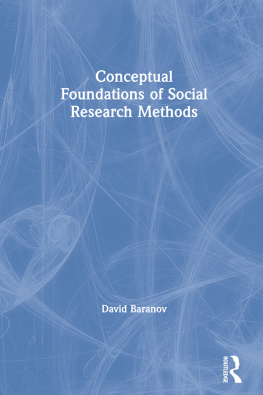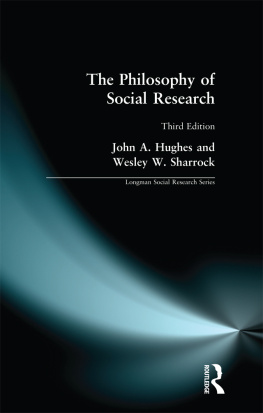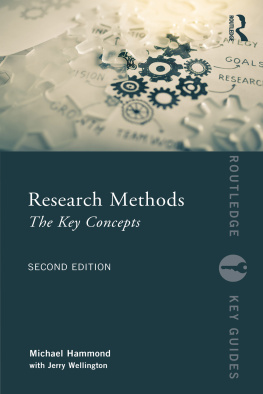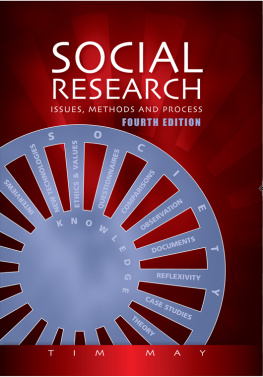
The Research Event
How can we research the not-as-yet? The Research Event is concerned with enabling and nurturing an empirical and analytic sensibility that can address that is speculate on the emergent and the prospective in social life.
A distinctive and novel contribution, this book introduces and expands on the notion of the research event, equipping the researcher with the speculative means to connect with the changing landscape of social scientific research. As such the research event is understood as a fluid, unfolding process that encompasses a multitude of heterogeneous ingredients, ranging from the formulation of research questions, through the vagaries of participant engagement, to the practices of writing and dissemination. The book aims to provide social science researchers with practical and conceptual heuristics for the opening up of research practice so that it better engages with, but also better provokes, the possibilities that are entailed in the doing of social research.
Inventively and entertainingly, the book draws on many of the authors own empirical examples to illustrate critically the use and value of these heuristics. As a research event in itself, this book is a speculation on prospective methodologies and an invitation to explore the possibilities of social research. This book will appeal to a broad range of social science researchers, from advanced undergraduates to established scholars. It will be a key reading in advanced BA and MA courses on alternative research methodologies, or a supplementary reading on more traditional courses aiming to include emerging methods.
Mike Michael is a sociologist of science and technology, and a professor in the Department of Sociology, Philosophy and Anthropology, University of Exeter. His research interests include everyday life and technoscience; culture and bioscience; and prospective methodologies. He is author of ActorNetwork Theory (2017).
The Research Event
Towards Prospective Methodologies in Sociology
Mike Michael

First published 2022
by Routledge
2 Park Square, Milton Park, Abingdon, Oxon OX14 4RN
and by Routledge
605 Third Avenue, New York, NY 10158
Routledge is an imprint of the Taylor & Francis Group, an informa business
2022 Mike Michael
The right of Mike Michael to be identified as author of this work has been asserted by him in accordance with sections 77 and 78 of the Copyright, Designs and Patents Act 1988.
All rights reserved. No part of this book may be reprinted or reproduced or utilised in any form or by any electronic, mechanical, or other means, now known or hereafter invented, including photocopying and recording, or in any information storage or retrieval system, without permission in writing from the publishers.
Trademark notice: Product or corporate names may be trademarks or registered trademarks, and are used only for identification and explanation without intent to infringe.
British Library Cataloguing-in-Publication Data
A catalogue record for this book is available from the British Library
Library of Congress Cataloging-in-Publication Data
Names: Michael, Mike, author.
Title: The research event: towards prospective methodologies in sociology/Mike Michael.
Description: Milton Park, Abingdon, Oxon; New York, NY: Routledge, 2022. |Includes bibliographical references and index.
Identifiers: LCCN 2021033154 (print) | LCCN 2021033155 (ebook) |ISBN 9780815354239 (hardback) | ISBN 9780815354277 (paperback) |ISBN 9781351133555 (ebook)
Subjects: LCSH: Social sciencesResearch. | Social sciencesMethodology.
Classification: LCC H62 .M4297 2022 (print) |LCC H62 (ebook) | DDC 300.72dc23
LC record available at https://lccn.loc.gov/2021033154
LC ebook record available at https://lccn.loc.gov/2021033155
ISBN: 978-0-8153-5423-9 (hbk)
ISBN: 978-0-8153-5427-7 (pbk)
ISBN: 978-1-351-13355-5 (ebk)
DOI: 10.4324/9781351133555
Typeset in Bembo
by Newgen Publishing UK
Contents
Introduction The research event
DOI: 10.4324/9781351133555-1
In the beginning or the middle
As a condition of the funding grant for my PhD studentship in Social Psychology, I was obliged to attend a methods training session organized for all first-year UK Psychology PhD students who were funded in the same way. We were each asked to provide a precis of our research topic and approach. These summaries were pinned to a board so that we (and our instructors) could get a sense of the sorts and range of interests within the cohort. One evening, we were treated to a keynote talk by a well-known senior psychologist. Standing next to an old battered heater, the professor assured us that one day we would be standing where he was. We were the future generation of famous psychologists. He then offered advice on how to gain a PhD in Psychology quickly and efficiently. Find an anomaly in a sequence of experiments in ones chosen field (say, on some aspect of cognitive processing) and then work on that through ones own series of experiments. What one should not do, he said, was and then he started reading out my precis.
In retrospect, I am in no doubt that my little summary was pretentious, overambitious, arrogant and not a little devoid of empirical substance. It would have been replete with postmodern bombast and post-structuralist jargon, all of which was alien to Experimental Psychologists. At the time, needless to say, I was outraged by such unfair treatment at the hands of a senior academic.
Why do I begin with this anecdote? Is it because the events described in it had a formative effect on me? No doubt there is some sort of continuing catharsis going on especially in light of the number of times Ive repeated the story (names have been left out to protect the guilty). More relevantly, it is an anecdote that serves the purpose of opening up what might be meant by the research event. Located at a distance in time and place, it nevertheless I would argue can still be thought as an element, albeit small and of perhaps dwindling significance, in the emergence and unfolding of a research event that Im subsequently involved in. It is indicative of the heterogeneity of elements, more or less proximal in space and time, that feed into what it is we do when we do research, and what is done through (and to and with) us. Moreover, in the retelling of the anecdote, there is a refreshing (and altering) of the affects associated with the original event that is now caught up in a reconfiguration of times and places: and all these too feed into the research event.
This affective dimension of doing research should come as no surprise. After all, the doing of empirical research is one of the most affecting things we can do as social scientists, at whatever stage in a career. These affects are shaped by numerous factors of which a subset might include our personal investment in or disillusion with the identity of researcher; the more or less urgent topics we are investigating; our participants (sometimes called co-researchers) and their more or less disadvantaged conditions; our collaborators drawn from different walks of academic life; and our institutions with their chronic rivalries and contested injustices, and their formal and informal requirements for research productivity, global relevance and, increasingly, high-profile impact. Of course, these affects are not so easily separable in the everyday experience of the researcher. Our sense of self as a researcher is influenced by our collaborations, our participants reconfigure our research questions, our institutions have an influence over what is viably researchable as a topic, and our intellectual community affects the framing of our research field (just as the so-called affective turn has affected the foregoing framing in terms of affect). We might say, drawing loosely on actornetwork theory, that we are enmeshed in a nexus of networks or assemblages that affects us in a number of ways, even as we are busily trying to put together something like our own research network to affect the world around us. Such a network might minimally include recruiting various constituencies to identify with our research topic, drawing on colleagues expertise to formulate and refine research questions and associated research design, working with administrators to develop a research proposal that might successfully attract funding, forging research collaborations and finding research participants, doing the actual empirical research in the midst of teaching and administration demands, subjecting the data to analysis and writing up the results and finding the time initially to craft, and then negotiate, the acceptance of a journal paper or a monograph.








